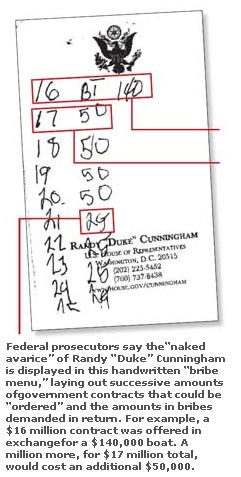
On March 3, 2006, U.S. Congressman Randy "Duke" Cunningham (R-CA) was sentenced to eight years and four months in federal prison months after pleading guilty to charges that he had accepted bribes from defense contractors Brent Wilkes of ADCS Inc. and Mitchell Wade of MzM Inc. Cunningham had previously resigned from Congress on November 28, 2005 after pleading guilty to the crimes.
What makes the case really interesting is that Cunningham created a price sheet that outlined what benefits could be obtained for bribes of certain values (see image). The San Diego Union-Tribune outlines the details:
The prosecutors' papers listed previously untold details of Cunningham's crimes, including a “bribe menu” found on Cunningham's boat that detailed in his own writing how much it would cost Pentagon contractors for each million dollars in business steered their way.
The menu offered a $16 million contract in exchange for a $140,000 yacht. The bribes then grew by $50,000 for every $1 million in additional funding, according to the list, which included a volume discount as the contracts grew.
UC-San Diego economist James Hamilton comments on Cunningham's volume discount:
For example, going from $17 million to $18 million would cost you an extra $50,000 in bribes, but once you get past $20 million, we offer a special deal of an extra $1 million in contracts for only $25,000 in additional bribes.
The volume discount aspect of the bribery scandal is what I find most fascinating - what on earth could explain why Cunningham was willing to reduce his take in return for providing millions and millions more in contracts with his co-conspirators? So far, I've been able to come up with the following hypotheses:
- Declining Marginal Risk. In this hypothesis, the greatest risk for a Congressman accepting a bribe lies in providing the first service on behalf of the one doing the bribing. For example, it could be a sting operation being run by a law enforcement agency. Because of this risk, the initial price for which a Congressman might sell out is set fairly high. Once it's been established that the briber will pay the first bribe however, the marginal risk of providing additional services on behalf of the briber is much less, which is reflected in the declining level of bribes to the Congressman as the benefits for the individuals doing the bribing increases.
- Increased Risk of Discovery. Here, the theory is that the chance that the bribery will be discovered increases with the size of the bribes being offered. So, our unintrepid Congressman reduces this risk by accepting smaller bribes as the benefits to the briber increases. I strongly suspect that this is the kind of problem that only criminals really have.
- Competition. In business, a company may, in seeking to establish a long-term relationship with a good customer, provide them with a volume discount for its products and services. This has two benefits: First, it reduces the risk of losing a customer to a competitor by keeping them happy. Second, it provides a competitive edge since the cost to the customer of seeking another business to provide the same product or service is higher. Why would the business of bribery work any differently in a competitive environment?
Recent events suggest that the third hypothesis of Competition provides the best explanation, as the circumstances surrounding the alleged corruption of Representative William Jefferson, D-LA, and Representative Alan Mollohan, D-WV are just now coming to light. Who knows what other "bribe menus" there might be floating around the halls of Congress?
Welcome to the blogosphere's toolchest! Here, unlike other blogs dedicated to analyzing current events, we create easy-to-use, simple tools to do the math related to them so you can get in on the action too! If you would like to learn more about these tools, or if you would like to contribute ideas to develop for this blog, please e-mail us at:
ironman at politicalcalculations
Thanks in advance!
Closing values for previous trading day.
This site is primarily powered by:
CSS Validation
RSS Site Feed
JavaScript
The tools on this site are built using JavaScript. If you would like to learn more, one of the best free resources on the web is available at W3Schools.com.